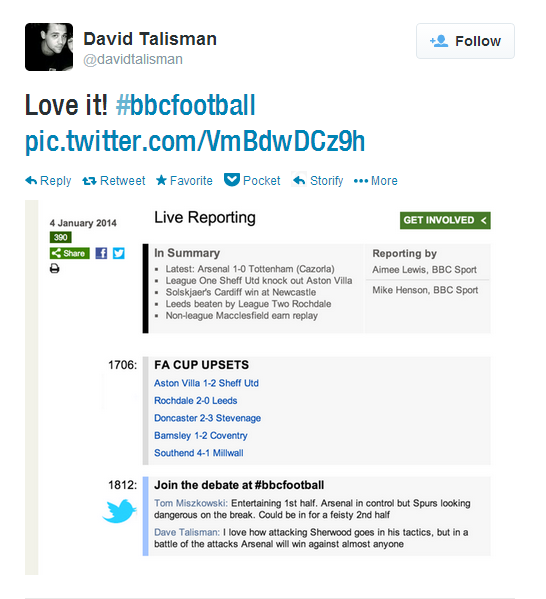Inside the BBC Sport Live Text – How to do a great live blog
Live blogs are becoming a great way for you to get noticed online these days. I spent a long weekend doing some work experience for BBC Sport last month and helped out on The FA Cup live text, one of the most popular live blogs going. So I thought I’d take advantage of this and describe what it was like as well as pointing out the bits that I thought were really good and make their service really valuable.
How the BBC Football Live Text is done
On the face of it you might consider a live blog to be the job of just one person gathering relevant data and posting it every few minutes. However, the BBC Live Text is a rather more complex operation and on a busy day like the FA Cup third round Saturday there are a whole team of about 10-15 journalists contributing to the text.
These are the roles and functions:
Editor – As you might expect, the live text editor oversees the whole of the live text and makes sure everything is running smoothly and everybody has been allocated specific tasks or games to cover.
Live Text Input – This job was done by a couple of people on the weekend of the FA Cup third round but this was a busy occasion and on quieter days one person is sufficient. These are the people that give the live text its basic tone, giving context on the day’s play and also explaining points of interest such as goals or red cards (example below).
Broadcast journalist – These are the people who will write the match reports at the end of the game. They are each responsible for covering their allocated matches and will inform the people inputting the live text when a significant moment happens in their game(s). When I went there were about 8 broadcast journalists mainly monitoring the games involving Premier League clubs. *Interestingly because the BBC don’t have the highlights rights to the FA Cup the journalists were having to listen to local radio feeds in order to keep track of their matches*.
Media Monitors – The media monitors do what it says on the tin. They monitor BBC Sport’s various social media feeds as well as the phone text service and select the best comments to use on the live feed. They also transcribe and input the comments of BBC analysts (picture below) when significant moments happen in a game. The media monitor’s job can be pretty relentless, especially as there is usually only one of them. I was also mucking in by keeping track of the scores and posting summaries of the games not being covered by the broadcast journalists.
Why BBC Football’s live text is a great example of a live blog
There are a three main reasons why I think that the BBC live text is such a good example of a live blog and here they are:
1) The first reason why the live text works well is because they have such a huge pool of information to draw from. With access to the local radio feeds they are ideally placed to comment on events as they occur. With analysts placed at each match they also have a lot of quality content at their disposal this adds real value. While this kind of wall to wall football coverage is going to be difficult to replicate if you aren’t the BBC, it does show that you need to prepare well in advance of the event that you’re intending to cover and lay down a framework that makes it easier for you later on.
2) The way in which the BBC’s online community is involved is also beneficial to the live text as an engaging piece of content. There are three main ways that the community can interact with the live text, through Facebook, Twitter and by texting in. By doing this regularly this creates a good debate around the footballing action by featuring selected comments you can also provide a real sense of validation for those who have chosen to comment (example below). This is brilliant for generating loyalty to your brand.
3) The third, final and possibly most important thing to mention is that the feed is extremely well regulated. This is where having one or two people who specifically input the text becomes important because behave as gatekeepers, letting through different kinds of entry where they deem it most appropriate to telling the story. This means that at some points there will be little entered onto the live feed but match updates or some points where there will be more social media oriented posts. Readers can follow the action and their experience is enhanced by the comment and analysis – it doesn’t become a distraction.





nice post